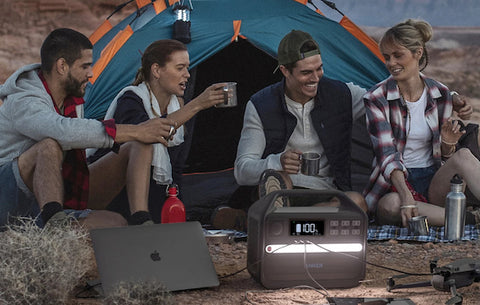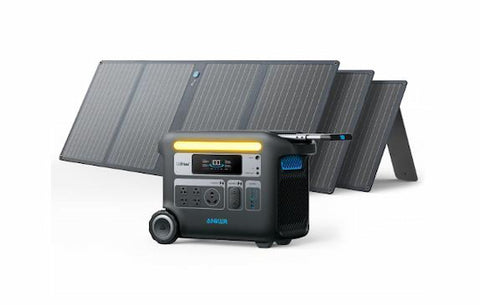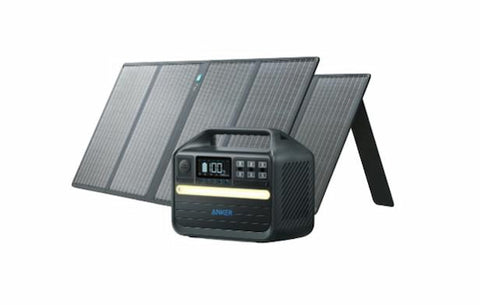
Find the Best Portable Camp Generator: Everything You Need to Know
Share
If you're heading out into the great outdoors for camping and other adventure activities, a reliable portable camp generator is one of the most essential items to pack. A good generator can provide you with all the power necessary to enjoy your time away from home. But with so many options on the market today, deciding which model is best for your camping trip can feel overwhelming. To help you choose, this blog post will provide everything you need to know when selecting your perfect portable camping generators, including the factors you should consider and 2 top picks of portable generators for camping.

What Is a Portable Camp Generator and How does It Work?
A portable camp generator produces or converts power into electricity that can be used through an outlet. A traditional camp generator typically uses gasoline, diesel, or propane to power an engine that converts mechanical energy into electrical energy; while a solar generator uses solar panels to convert the energy from the sun into electricity.
Why Use a Portable Camp Generator?
Portable camp generators are an essential item that can make your camping experience more comfortable and secure. And they are perfect for powering up all of your camping gear or appliances without having to rely on traditional sources of electricity. The following are some benefits of portable camp generators:
- First, they're incredibly convenient to use and easy to transport, meaning that you won't have to worry about lugging around a heavy and bulky generator.
- Also, they offer an excellent source of power whenever you need it, giving you the freedom to explore the great outdoors during the day and enjoy your favorite comforts in the evening.
- Additionally, they're reliable and durable, so you won't have to worry about them breaking down when you need them the most.
- Lastly, they're eco-friendly, often running on clean energy sources like propane or solar panels.
What to Consider When Buying a Portable Camp Generator
With so many options on the market, it can be hard to decide which camp generator to buy. Before making a purchase, there are a number of factors to consider, from size and type to noise level, power output, and cost.
Size
The size of a portable camp generator you need depends on the devices you’ll power. The more electricity you require, the larger the generator required. For example, if you want to power small electronic devices, like a phone or an iPad, then a camp generator with around 1000W of power is enough. However, if you want to power an RV and its appliances, you may need a portable generator that delivers around 5,000W of power.
Type
There are two main types of camp generators that you can choose from: conventional generators and inverter generators.
Conventional generators: They are the older model that uses a fuel engine to rotate the alternator, which then creates power. The mechanical energy used to spin the rotor can come from a variety of sources, such as steam, gas, or water. Conventional generators are typically large and heavy, and require a significant amount of maintenance to keep them running smoothly.
Inverter generators: They are more modern and use advanced technology to convert DC power into AC power. They are much quieter than conventional generators, and their compact size makes them perfect for camping. They are also more fuel-efficient and offer a cleaner electrical output for sensitive devices like laptops and smartphones.
Noise Level
When you are camping, there is nothing more enjoyable than being surrounded by nature's tranquility. Thus, it's essential to consider the noise level of your camp generator when making your choice. If you want a noise-free generator for camping, solar generators will be your best choice, as they produce power through solar panels rather than fuels.
Power Output
Power output is one of the most significant features of the generator. To figure out how much electricity is needed to operate essential appliances, you can calculate the power requirements for each separately, and then add them up. Once you've determined your power needs, you can begin looking up reviews and comparisons of portable generators, or read this for guidance. Anker portable power generators come with chargers for mobile phones, laptops, and other electronics.
Cost
There is no standard budget for purchasing a portable camp generator since there are various factors to consider. Generally, smaller portable generators can cost anywhere from $500 to $3,000, while larger standby generators for residential use can range from $5,000 to $10,000 or more.
Top Picks of Portable Camp Generators
Compared with fuel-powered camp generators, solar generators are less noisy, better for the environment, and more cost-effective. Therefore, they are increasingly popular among campers. Anker offers powerful and affordable solar generators, and the following are two top picks of Anker solar generators for camping:
Anker 767 Solar Generator
With a 2400W portable power station and three 100W portable solar panels, the Anker 767 Solar Generator can provide endless power for your outdoor relaxation. The portable power station boasts an impressive 2048Wh capacity and an enormous 2400W AC output, making it an ideal solution for powering a vast range of outdoor appliances, including blenders, air pumps, and electric grills.
In addition, each solar panel can convert sunlight into solar energy with an impressive efficiency of up to 23%, and charge your solar generator even on cloudy days. Besides, these panels are scratch and weather-resistant, ensuring they continue to operate effectively for your outdoor expeditions. With these functions, you don't have to worry about running out of energy outdoors.

Anker 555 Solar Generator
Anker 555 Solar Generator consists of a 1000W portable power station and two 100W portable solar panels, providing reliable power to meet your basic electric needs in the outdoors. This power station is exceptionally durable and efficient, thanks to its unibody drop-proof structure and a 45% higher charging efficiency with a 200W input. Moreover, it incorporates three high-speed USB-C ports, two USB-A ports, making it an ideal long-lasting solution for powering your devices.
As for solar panels, featured with Anker’s Suncast technology, they can be adjusted correctly to capture the direct sunlight for maximum charge. And these panels are capable of over-voltage and short-circuit protection, which will keep you and your devices safe.

Conclusion
Portable camp generators are a great way to give you the power you need while camping. We've gathered all the information you need to help you find the best portable camp generator; from considering its size, type, noise level, power output, and cost. With our buyer guide in mind, you can confidently equip yourself with an efficient and trustworthy portable generator, making your next camping adventure as comfortable as possible.
FAQ
Can You Charge All Devices with a Solar Generator?
Solar generators can provide power to nearly all standard household appliances including laptops, lights, microwaves, ceiling fans, and more. These generators are great alternatives in times of power outages and when grid-connected solar energy is not available.
Will Solar Generators Work in Bad Weather?
Solar generators can work in bad weather such as overcast days, though their efficiency is reduced compared to sunny days. The extent of cloud coverage will determine the percentage of power output. While sunny weather is preferred over gloomy conditions, extreme heat is not ideal for solar panels.
What Size Solar Generator Do You Need?
To determine what size of solar generator you need, start by making a list of the appliances you need to power and their wattage.
Add up the total power requirements and select a solar generator that is capable of meeting or exceeding that total. Keep in mind that the larger your solar generator, the more power it will generate, and the longer it will take to recharge fully.